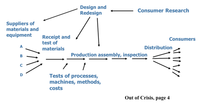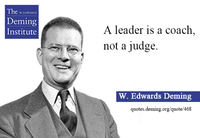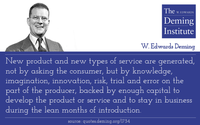Posts selected fromManagement Blog - Engineering Blog - Investing Blog and other blogs - Quality Beginnings: Deming and Madison, Wisconsin
David Couper: "Deming’s teachings had a strong influence in Madison. Under Mayor Joseph Sensenbrenner (1983-1989), there was a near-total involvement by city employees in applying Deming’s work to city government. These were Madison’s golden years as government, business, and educational institutions worked together to make quality an organizational lifestyle in Madison. Deming helped us to see police work as a system capable of being improved.
We also learned the value of collaborating with and learning from others outside of law enforcement. We came to see that the systems for which we were responsible, were dependent on others around us (like when we realized the important systems-link between poverty, jobs, education, and crime). Most of all we saw the work we did as a system – and a system that could be improved." continue reading: Quality Beginnings: Deming and Madison, Wisconsin - Myth: If You Can’t Measure It, You Can’t Manage It
- Before Deming’s 14 Points for Management
 (principles 16 to 21) The consumer is the most important point - Performance of a product is the result of interaction between three participants: (1) the product itself; (2) the user and how he uses the product; (3) instructions for use, training of customer; service provided for repair. continue reading: Before Deming’s 14 Points for Management - Standardization Doesn’t Stamp Out Creativity
Standardization (and reducing variation) are means to improve performance. They are not means to dehumanize the workforce. W. Edwards Deming presented a management system that emphasized the importance of joy in work and encouraged the creativity everyone brings to work. Thinking that creating standardized work processes to bring that about are about making everyone be the same is to completely miss what Deming proposed. continue reading: Standardization Doesn’t Stamp Out Creativity - Ron Moen and Cliff Norman Discuss the Evolution of Deming’s Management Ideas
I share the believe about the management system expressed in the system of profound knowledge and the interaction of the components as the most powerful aspect of Deming’s message. It is hard to convey that idea easily.
Many other powerful messages Dr. Deming gave are also important, things like: control charts, the fallacy of blaming or rewarding individuals for system performance or variation, PDSA improvement cycle, respect for all employees, viewing the organization as a system, the importance of long term thinking with constancy of purpose, aspects of theory of knowledge (confirmation bias, seeing “patterns” where they don’t exist, accepting special cause explanations for system results…), customer focus, innovation, etc..
continue reading: Ron Moen and Cliff Norman Discuss the Evolution of Deming’s Management Ideas - Deming’s Management Ideas Evolved Into the System of Profound Knowledge
 W. Edwards Deming spent decades refining his thoughts on management and refining how to present those thoughts. That thinking culminated in what he call the System of Profound Knowledge (SoPK).
Over time his ideas remained grounded to what he expressed in the 1950’s. The expression of those ideas became richer and he raised the emphasis on understanding the critical interactions between the elements. He never saw the individual items (for example, individual points in the 14 points) as discrete items. They work together as a system. The SoPK provides a view that emphasizes the importance of the interdependence within the entire system of management. continue reading: Deming’s Management Ideas Evolved Into the System of Profound Knowledge - SEC chief quotes Deming
Security and Exchange Chairman William H. Donaldson:
This approach will, ultimately, better serve investors, and it will also gradually temper the pressures on some corporate executives to fudge the numbers. It would behoove us all to remember the words of W. Edwards Deming: “People with targets, and jobs dependent on meeting them, will probably meet the targets – even if they have to destroy the enterprise to do it.” continue reading: SEC chief quotes Deming - W. Edwards Deming and the Leander Way
Often people will say Deming isn’t just the tools. That is certainly true. But using tools and data to make improvement efforts concrete is important.
As Deming said, best efforts are not enough, you have to know what to do. But he also said, “Best efforts are essential.” Tools are not enough: and like best efforts, using them without understanding the management system can do damage. But tools are also essential and Leander’s experience shows a long term effort to integrate quality improvement tools into the management system to achieve long term continual improvement. continue reading: W. Edwards Deming and the Leander Way - Institute Leadership

The aim of leadership should be to improve the performance of man and machine, to improve quality, to increase output, and simultaneously to bring pride of workmanship to people. Put in a negative way, the aim of leadership is not merely to find and record failures of men, but to remove the causes of failure: to help people to do a better job with less effort.
W. Edwards Deming continue reading: Institute Leadership - Bill Scherkenbach Interview with Dr. Deming
 This video also provides a view of W. Edwards Deming's personality. He repeatedly expresses the importance of changing the management of our organizations to let those doing the work use their brains, which far too often American management represses due to heirarchacal management systems. continue reading: Bill Scherkenbach Interview with Dr. Deming - Product and Service Innovation is Driven by Customer Focused Organizations
 - Statistical Techniques Allow Management to do a Better Job
For all four groups of people [management, statistical administration, research, front-line workers], the statistical method is more than an array of techniques. It is a mode of thought-sharpened thinking. It helps anyone in the four groups, be he a machine operator or an executive, to make better decisions, and to do his work better, than he could do otherwise.
--- W. Edwards Deming
Those who continue to thinkW. Edwards Deming was focused on the factory floor alone have missed most of what he proposed. Improving the decision making at the executive level was always Deming’s focus. Continual improvement should be a part of everyone’s job but as executives have more authority the impact of improving their performance multiplies, or stifles, the impact of improvement anywhere else in the organization. continue reading: Statistical Techniques Allow Management to do a Better Job - W. Edwards Deming Discussing the Leadership We Need in Our Organizations
He mentions that walking around can be useful but it isn’t effective. Without the proper focus you only see a glossy picture. Going to where the work is done is important. But as with most management practices it must be done within a proper context and sadly it is often done in a superficial way. I discussed these ideas in my blog post, Management by Walking Around... continue reading: W. Edwards Deming Discussing the Leadership We Need in Our Organizations - Looking Back at "Some Notes on Management in a Hospital" by W. Edwards Deming
The head nurse returned to say that the nurse that was to give the infusion had recorded the infusion as given. It is possible that she recorded it in advance, with the intention to give it, and did not correct the record. Is this the regular procedure, to record intentions? Who would know? An unsuspecting physician, looking at the record for his patient, would assume that the infusion had been given, and could draw wrong inferences about how the patient had been doing on the drug. In my case, as it turned out, no harm. But how would he know? A nurse, or a physician, has a right to suppose that the medication was delivered as ordered and as recorded.
What is the purpose of the record? To inform the physician about intentions, or to tell him what happened?
It is even more difficult than usual to avoid blaming people when you are being forced to suffer. But even in this situation Dr. Deming understood the problems were a natural result of poor processes not of failures by individuals to do their best. continue reading: Looking Back at "Some Notes on Management in a Hospital" by W. Edwards Deming - Improving the System to Reduce Costs Isn’t The Same as Cost Cutting
Cutting costs by fiat via executive orders reduces the capability of the organization. Those costs are often born by customers. In the short term reducing costs in such a manner improves the financial statements. In the long run those cost reductions harm the companies ability to innovate, improve and delight customers.
If instead we create a continual improvement capability and culture in the organization we will make improvements that in turn reduce costs (the Deming chain reaction). continue reading: Improving the System to Reduce Costs Isn’t The Same as Cost Cutting
|